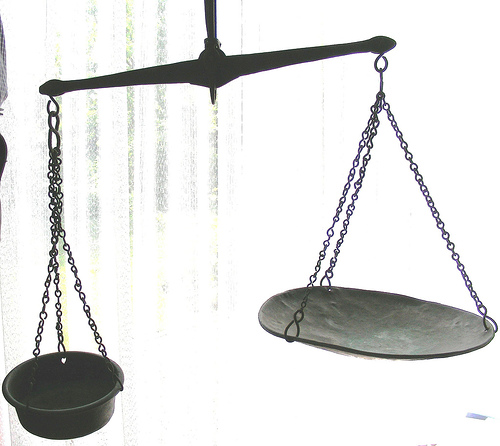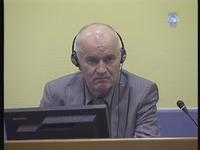
Justice # 2 (Foto InsideMyShell, Flickr)
The enthusiasm for Ratko Mladić’s arrest has generated a mission accomplished climate with regards to justice for the crimes committed in the ‘90s. There are still, however, many ongoing trials, both at The Hague and in the local Courts, and many cases still to investigate
On Monday the 6th of June, in presenting his periodical report to the United Nations Security Council, Serge Brammertz, the prosecutor for The Hague’s International Criminal Tribunal for the former Yugoslavia (ICTY), thanked the Serbian authorities for Ratko Mladić’s arrest. “Serbia has met one of its key obligations towards the Tribunal and simultaneously acknowledged the rule of law as a central building block for its future”. Brammertz then added: “We want the remaining ICTY fugitive – Goran Hadžič – apprehended without further delay”.
According to the prosecutor, “Serbia now has an important opportunity to help the public understand why Ratko Mladić has been arrested and why justice demands that he stand trial”. Indeed, The Hague appears to be more and more aware of the different reactions to the trials and how these are welcomed in the Countries of the region. With regards to Croatia and the recent decision in the Gotovina case, Brammertz declared it “unfortunate that in the aftermath of the judgment, the highest [Croatian] state officials failed to comment objectively on the outcome of the case”.
Concerning Bosnia and Herzegovina, the prosecutor voiced great worry for the recent initiatives aimed to weaken the work of the State Court and Prosecutor’s Office, making a clear hint to the referendum on these institutions proposed by the Bosnian Serbs. He then concluded urging the region’s various State Prosecutions to collaborate on war crimes issues.
Mission accomplished?
For some time now, the route to justice for the crimes committed in the ‘90s in the Balkans has been shifting more and more from The Hague to the local Courts. Enthusiasm has been shown from many sides for the closing of the era of Mladić’s hiding, for the symbol being brought to justice. This enthusiasm, however, could now raise many doubts on what will happen to the second and third rows, i.e. the lower-rank criminals who are to be judged locally. The post-Mladić climate feels a lot like that of a “mission accomplished”. At least in Serbia.
It is going to be years, though, before the trials are over, not only locally but also at The Hague. Given the number of crimes committed, it will also be difficult for the victims to ever consider a traditional route to justice to be complete. Awaiting for new tools to be established, transitional justice initiatives or projects like the REKOM, it is important to stay focused on the ongoing trials. The Tribunals, in fact, are still the only possibility for victims to find some degree of reparation for the injuries suffered.
As far as the situation at The Hague is concerned, the progress of the works can be reconstructed according to the recent report by the Tribunal’s President, Judge Patrick Robinson, presented to the Security Council on Monday the 6th of June along with the Prosecutor’s.
The completion strategy
The ICTY Prosecution has not raised new indictments in years, nor will it do so in the future. Indeed, since 2004 the UN Security Council has been asking the Tribunal (resolution 1534) to present a report on the progress of ICTY’s work within the “completion strategy”, i.e. to reach completion. The Tribunal costs money and since last December the UN has foreseen transition – with times and ways still to be precisely defined – towards the so called “International Residual Mechanism”, concerning the two Penal Courts established ad hoc: the one for the Former Yugoslavia and the one for Rwanda.
In his recent report, Judge Robinson details the progress of the ongoing trials, underlining time and again that the institution he is leading is strongly understaffed and that this has heavy repercussions on the duration of the trials. This concept is scattered throughout the Judge’s report and in one passage he underlines how the institution is in ‘desperate’ need of support to complete its work.
Compensations
Robinson also states that the victims of the conflicts in the Former Yugoslavia are entitled to receive compensations for the wrongs they have suffered. The Judge advocates to the Security Council for a trust fund to be created for these victims. The Tribunal cannot, Robinson writes, “through the rendering of its Judgements alone, bring peace and reconciliation to the region. Other remedies should complement the criminal trials if lasting peace is to be achieved, and one such remedy should be adequate reparations to the victims for their suffering”.
Up to date, the Tribunal of The Hague has completed trials against 125 people out of the 161 it has indicted in its 18 years of existence. Seventeen indicted are presently undergoing appeal, 14 the first instance and for two of the people accused (Mladić and Hadžić), the trial is still to begin.
Radovan Karadžić, 2018
Radovan Karadžić first appeared before the Judges on 31 July 2008 and his trial began on 26 October 2009. The former Bosnian Serb leader is charged with genocide, crimes against humanity and violations of the laws and customs of war in Sarajevo, Srebrenica and 20 other Bosnian municipalities. The Prosecution is still providing evidence and witnesses on the Sarajevo attacks. The Prosecutor has up to date used 122 out of the 300 hours at his disposal for providing evidence: according to him, the indictment phase should end in a year. The highest percentage of the hearing (69,6%) has been until now used for the cross examinations of the witnesses brought by the defendant. According to the President of the Tribunal, the trial will not be over before June 2014. The final sentence, after the appeal, could be in 2018, almost 30 years after the beginning of the conflicts in Bosnia and Herzegovina.
Vojislav Šešelj
The Vojislav Šešelj case is all the same complex. He first appeared before the Judges on 26 February 2003 and the trial only started in November 2007, undergoing various interruptions. Šešelj is charged with 9 counts for crimes against humanity and violations of the laws and customs of war committed in Croatia, Bosnia and Herzegovina and Vojvodina between August 1991 and September 1993. The sentence is expected in September 2012, but it is only an estimation subject to changes. The trial is currently in the defense phase, with Šešelj defending himself. Last May 5th, the panel of Judges rejected a request by the defendant: arguing that the Prosecution had not provided enough evidence to proceed with the trial, Šešelj had requested acquittal. The defendant is also indicted at The Hague in another trial, accused with offenses against the Court for having disclosed in one of his publications the identity of 11 witnesses under protection. In this case, the sentence is due within the month.
Stanišić and Simatović, Tolimir, Haradinaj
As to the trial against Jovica Stanišić and Franko Simatović, charged with crimes against humanity and war crimes, the Prosecution has terminated bringing charges and the defense phase started yesterday, the 15th of June.
Zdravko Tolimir, former responsible of Security for the Bosnian Serb army and, according to various investigators, post-war mastermind of the network that shielded the fugitive Mladić, could not be tried with the so called “Srebrenica Seven”, though belonging to the same trial, as he was transferred to The Hague only later. The trial against the “Srebrenica seven”, Popović and 6 other High Officials of the RS army and police, is already over. The sentence for Tolimir instead, arrested only in May 2007, is expected in October 2012.
Other ongoing trials include the ones to Mićo Stanišić and Stojan Župljanin, the one to Momčilo Perišić and the Jadranko Prlić trial. The latter was accused, along with other Bosnian Croats, of war crimes and crimes against humanity committed against Bosnian Muslims between 1991 and 1994. His trial is exceptionally long and complex. Six accused, 26 counts, 70 different crime scenes. According to the forecast by Judge Robinson, this will probably turn out to be the longest trial in the history of the Tribunal.
As to Kosovo, the Appeals Chamber of the ICTY has ordered a partial retrial of Ramush Haradinaj. The start of the trial against the former leader of the KLA is scheduled to be in June and the new sentence is expected by next summer.
Communicating international justice to the societies of the region
The Judges of The Hague have had to face cases of great complexity. In the eyes of the victims, however, the length of the trials risks undermining the effectiveness of the ICTY. In order to improve communication with the societies struck by the ‘90s conflicts, the Tribunal has long carried out the Outreach Program. Through meetings with local communities, public debates and the work of the offices in Sarajevo, Belgrade, Zagreb and Pristina, the Magistrates of The Hague have been trying to bring their work closer to the victims and to explain its outcome.
This facet of the ICTY’s work is of fundamental importance, but unfortunately it is still undeveloped, especially because of the lack of adequate resources. A well organized multilingual portal, press conferences at The Hague and new tools such as Twitter and YouTube are not enough to effectively reach the victims, who very often live in remote places of the Balkan countryside. Under this respect, the Tribunal’s communication is still subordinate to the voice of the region’s major media, namely television. Those TVs, however, do not always report facts with the necessary objectivity and, in some cases, are still strongly guided by the national rhetoric who played such an important role in hiding, or justifying, the crimes of the '90s.









 To Top
To Top